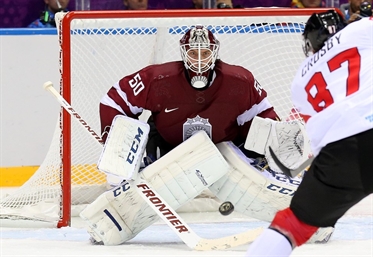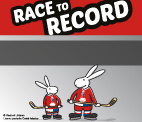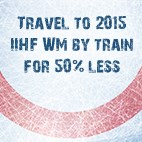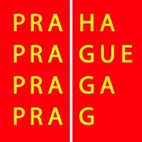Surprising starting goalies
Surprising starting goalies
History of odd picks from Myshkin to Gudlevskis

 Surprising Latvian goalie Kristers Gudlevskis also makes this save against Sidney Crosby in the Olympic quarter-final in Sochi 2014 that Canada won 2-1. Photo: Andre Ringuette / HHOF-IIHF Images
Surprising Latvian goalie Kristers Gudlevskis also makes this save against Sidney Crosby in the Olympic quarter-final in Sochi 2014 that Canada won 2-1. Photo: Andre Ringuette / HHOF-IIHF Images
Why? Because the top Czech NHL goalie, Ondrej Pavelec of the Winnipeg Jets, was sitting on the bench. And while Salak has put up impressive numbers in the KHL over the last two years, most observers would still tab Pavelec as the better option.
Salak struggled in the opening 6-5 loss to Sweden and allowed two goals on six shots against Latvia before getting yanked in favour of Pavelec. The Sibir Novosibirsk netminder currently owns a 74.2 save percentage and 5.44 GAA. (In fairness to Salak, Pavelec didn't prove to be a savior against Canada, giving up five goals on 37 shots.)
However, this was far from the only time in international hockey history that a coach has made an unusual choice with his starting goalie. Let's take a look back.
One stunning high-profile example was the late Soviet coach Viktor Tikhonov’s replacing the legendary Vladislav Tretiak with Vladimir Myshkin for Game Three of the 1979 Challenge Cup at New York’s Madison Square Garden.
The one-off series supplanted the annual NHL All-Star Game. A team made up of Canadian superstars like Guy Lafleur and Mike Bossy plus three Swedes (Anders Hedberg, Ulf Nilsson, Borje Salming) confronted the Olympic and World champion Soviets. The series was tied 1-1 after Canada won the opener 4-2 and the USSR earned a 5-4 comeback victory in Game Two.
At this point, the diminutive blonde 23-year-old Myshkin was an unknown. This goalie of Krylya Sovietov Moscow (Soviet Wings) hadn’t even made his IIHF debut yet – that would come two months later at the World Championship in Moscow. The Canadians had great respect for Tretiak dating back to his heroics in the landmark eight-game 1972 Summit Series. It seemed insane for Tikhonov to go with someone else.
And yet, Myshkin delivered. With NHL bench boss Scotty Bowman also making a goalie switch (Montreal’s Ken Dryden came out in favour of Boston’s Gerry Cheevers), the Soviets romped to a 6-0 win. Myshkin posted a 24-save shutout.
Of course, these choices don’t always pay off. In the 1984 Canada Cup finals, Swedish head coach Leif Boork decided to gamble after losing 5-2 in Calgary to the Wayne Gretzky-led Canadians to kick off the three-game final. He took out starter Peter Lindmark, who’d played all seven games in the tournament so far and had been named Best Goalie at the 1981 Worlds. In came backup Gote Walitalo.
Boork hoped that Canada would struggle against the Bjorkloven goalie because they knew nothing about him. Instead, Walitalo gave up four goals on 10 shots before Boork put Lindmark back in. The Swedes rallied to make it close, but Canada took the title with a 6-5 triumph.
In general, European coaches are less likely than their North American counterparts to adhere to the “if it ain’t broke, don’t fix it” philosophy. Again, Tikhonov, the winningest coach in IIHF history, provides an example. The Soviet Union had taken a 1-0 lead in the 1987 Canada Cup final with a 6-5 overtime victory on Alexander Semak’s goal, and Sergei Mylnikov was between the pipes. While Canada’s Mike Keenan stuck with Edmonton Oilers star Grant Fuhr in net for Game Two, Tikhonov subbed in the late Yevgeni Belosheikin for Game Two.
It proved to be arguably the ultimate classic of 1980’s run-and-gun hockey, and Belosheikin played well as Canada fired 43 shots in this double-overtime thriller. However, the Soviets lost 6-5 on Mario Lemieux’s overtime winner, and they wound up losing the series on the classic Game Three “Gretzky to Lemieux” goal with 1:26 left that made it 6-5 Canada again. There, Mylnikov was back in net.
In the new millennium, one of the most unusual goalie conundrums ever arose after Dominik Hasek went down with a tweaked groin just over nine minutes into the Czech Republic’s 4-1 victory over Germany to open the 2006 Olympics. Tomas Vokoun, having backstopped the Czechs to World Championship gold in Vienna the year before, was the natural choice to take over between the pipes.
However, Vokoun’s only preliminary round win as a starter came over lowly Italy (4-1). He lost to Switzerland (3-2) and Finland (4-2) and was pulled in favour of Milan Hnilicka after surrendering three first-period goals in the final round-robin loss to Canada (3-2).
Czech coach Alois Hadamczik then surprisingly elected to hand the keys to the car to Hnilicka for the playoff games. Now, the 33-year-old was no novice. A three-time World Championship winner, he’d been named Best Goalie at the 2001 tournament in Germany. But he’d been out of the NHL for two years and was now playing for Liberec in the Czech Extraliga. Vokoun was in his prime with the Nashville Predators. It was a head-scratcher.
The bold move seemed to pay dividends when the Czechs beat Slovakia 3-1 in the quarter-final. But up against Sweden in the semis, it was a different story. Tre Kronor opened up a 5-1 lead on the Czechs, with Hnilicka facing 20 shots before he was yanked, and Vokoun went back in. It was too late to salvage the road to the gold medal game, however. Sweden won 7-3. The Czechs would take the bronze with Vokoun earning a 3-0 shutout against Russia.
Afterwards, Vokoun was not happy with Hadamczik’s reasoning. He told reporters: “Looking back, you never know, but I felt we would have had a better chance to beat Sweden if I would have played. My play in the preliminary round wasn’t as good as I would have liked and that opened the door for the coach to wonder. It’s unfortunate because I think we had the best team.”
France certainly didn’t have the best team when it faced defending champion Russia at the 2013 Worlds in Helsinki. But when head coach Dave Henderson put Florian Hardy in goal in lieu of veteran Cristobal Huet, the only Frenchman ever to win the Stanley Cup (2010), it was a calculated move by the underdogs. On paper, the likelihood was that the French would lose regardless. Why not see if they could throw Russian snipers like Ilya Kovalchuk and Alexander Radulov for a loop?
It worked. Although Alexander Perezhogin beat Hardy for the game’s first goal midway through the second period, Damien Fleury and Antoine Roussel gave the French a 2-1 lead they wouldn’t relinquish. Hardy was excellent, recording 28 saves en route to France’s first win ever over Russia in international competition and one of the biggest upsets of all time.
Latvian coach Ted Nolan almost pulled off the same kind of gambit on an even bigger stage: the 2014 Olympics in Sochi, Russia. With Latvia facing Canada, the two-time Olympic champions, in the quarter-finals, the obvious choice in net would have been Edgars Masalskis. Playing in his third Winter Games, the acrobatic 33-year-old Riga native had evolved into his country’s go-to guy since debuting in elite IIHF play at the 2004 World Championship.
But instead, Nolan picked 21-year-old Kristers Gudlevskis, who’d played in the ECHL and AHL that season. His top-level international experience consisted of four World Championship games in 2013.
What a show Gudlevskis put on. Despite being heavily outplayed by Canada, the tiny Baltic state kept the game tied 1-1 deep into the third period. Gudlevskis was incredible, stopping 55 of 57 shots. It took a Shea Weber rocket with 6:54 remaining to beat him. A Tampa Bay prospect, Gudlevskis very nearly spoiled Sochi for Lightning GM Steve Yzerman, who served as Canada’s executive director en route to a second straight Olympic gold.
Will we see more surprising starting goalies at the 2015 IIHF Ice Hockey World Championship? It’s entirely possible in a game where crazy bounces and injuries happen, and in a tournament that flashes by so quickly.
Back to Overview























































































